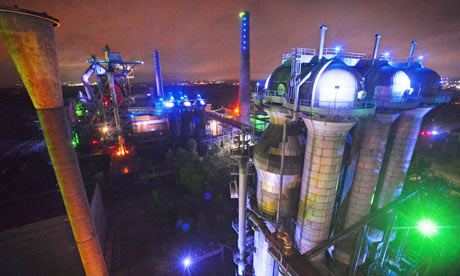
It has been called the Ruhr Valley's War of the Roses, the fight to save the core cultural life of the bankrupt city of Duisburg, after city administrators announced in May that the long-standing theatre co-operation agreement with Düsseldorf should cease because of a €7m shortfall in the cultural coffers.
The decision, which is being contested by the arts world in Germany and beyond, will effectively end the Deutsche Oper am Rhein – considered to be among Germany's 10 leading theatre institutions – and will seriously dent Duisburg's musical theatre and ballet output.
The two-city theatre agreement – in which neighbouring Duisburg and Düsseldorf have collaborated since 1956 in the Deutsche Oper am Rhein – has for decades been seen as an exemplary model for cultural co-operation between cities which maximised the use of funds and resources and enabled top-class artistic output for the region. Its cessation, which is scheduled for September 2014, would prove a serious blow to those who have advocated it as a model for other cash-strapped cities wishing to maintain artistic excellence.
Düsseldorf's opera and ballet programme will have far fewer resources. Duisburg's cultural fringe scene has already experienced huge financial cuts over the last few years, with campaigners already speaking of an unprecedented cull of the cultural world in western Germany and an irreversible decimation of cultural life for Duisburg's 490,000 inhabitants. It will also lead to considerable job losses for the 600-strong company.
City chiefs though, say the cuts are necessary. Duisburg is drowning in debts of almost €2.2bn and the theatre co-operation project, which costs €10m a year, would need to reduce its costs by at least €2.5m, which it considers unworkable.
A petition to save opera and ballet in Duisburg states what its signatories view as the inevitable consequences of the decision:
• The opera and ballet programme in Duisburg would have to be considerably reduced or possibly even shelved
• The Duisburg Philharmonic Orchestra, which performs about 70% of its work in the Duisburg Opera, would be directly threatened
• The work with children and teenagers, which has been developed since 2009 (with approximately 30,000 young visitors per year in Düsseldorf and Duisburg) would have to be largely abandoned
• A breakdown of the theatre community Düsseldorf Duisburg would bring about a significant reduction of the opera and ballet programme in Düsseldorf
The petition by the employees and friends of the theatre community Deutsche Oper am Rhein Düsseldorf Duisburg, the Duisburg Philharmonic Orchestra, the Düsseldorf Symphony Orchestra, the Ballett am Rhein, the Works Councils of Düsseldorf and Duisburg and others, appeals for the authorities to "put a stop to the gradual dismantling of cultural literacy" and to send a signal of "commitment to the life of Duisburg ... because", they say, quoting Richard von Weizsäcker the German president from 1984 to 1994, "culture is not a luxury we afford ourselves or can do without, but the spiritual foundation that guarantees our actual inner survival".
A final decision is expected in the autumn.

